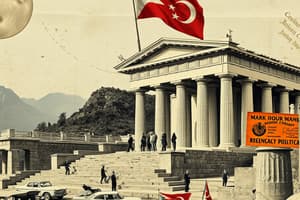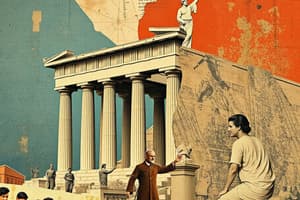Podcast
Questions and Answers
What was the earliest documented war of the ancient Greek period?
What was the earliest documented war of the ancient Greek period?
- The Greco-Persian Wars
- The Peloponnesian War
- The Lelantine War (correct)
- The Trojan War
What was the major cause of social unrest in ancient Greece that led to the rise of tyrants?
What was the major cause of social unrest in ancient Greece that led to the rise of tyrants?
- The rise of democracy
- The domination of politics and wealth by small groups of families (correct)
- The influence of foreign powers
- The lack of education for the lower classes
What was the main focus of education for boys in ancient Greece?
What was the main focus of education for boys in ancient Greece?
- Household management
- Reading and writing
- Athletics (correct)
- Music
What was the role of slavery in the ancient Greek economy?
What was the role of slavery in the ancient Greek economy?
What was the main focus of ancient Greek philosophy?
What was the main focus of ancient Greek philosophy?
What was the significance of Alexander the Great's conquests?
What was the significance of Alexander the Great's conquests?
What was the role of religion in ancient Greek life?
What was the role of religion in ancient Greek life?
What was the impact of ancient Greece on Western culture?
What was the impact of ancient Greece on Western culture?
What was the legacy of ancient Greece?
What was the legacy of ancient Greece?
Study Notes
Greek civilization from c. 1200 BC to c. 600 AD
-
Ancient Greece was a northeastern Mediterranean civilization, existing from the Greek Dark Ages of the 12th–9th centuries BC to the end of classical antiquity (c. 600 AD).
-
The era of classical antiquity was immediately followed by the Early Middle Ages and the Byzantine period.
-
Greek urban poleis began to form in the 8th century BC, ushering in the Archaic period and the colonization of the Mediterranean Basin.
-
The age of Classical Greece, from the Greco-Persian Wars to the 5th to 4th centuries BC, included the Golden Age of Athens.
-
The conquests of Alexander the Great of Macedon spread Hellenistic civilization from the western Mediterranean to Central Asia.
-
Classical Greek culture, especially philosophy, had a powerful influence on ancient Rome, which carried a version of it throughout the Mediterranean and much of Europe.
-
Classical antiquity in the Mediterranean region is commonly considered to have begun in the 8th century BC and ended in the 6th century AD.
-
The historical period of ancient Greece is unique in world history as the first period attested directly in comprehensive, narrative historiography.
-
The Lelantine War (c. 710 – c. 650 BC) is the earliest documented war of the ancient Greek period.
-
Sparta and Athens promptly turned on each other, at which point Cleomenes I installed Isagoras as a pro-Spartan archon.
-
The Persian Wars saw Athens and Sparta unite against the Persian Empire, but tensions between the two cities led to the Peloponnesian War.
-
The Peloponnesian War saw a series of invasions of Attica by Sparta, while Athens successfully fought the Corinthian empire in northwest Greece and defended its own empire, despite a plague which killed the leading Athenian statesman Pericles.Summary Title: Ancient and Roman Greece: Geography, Politics, and Society
-
Sparta installed the Thirty Tyrants in Athens after the Peloponnesian war, but their predominance did not last long.
-
The major Greek states attempted to dominate the mainland in the fourth century BC, leading to a power vacuum that was eventually filled by Macedon under Philip II and then Alexander the Great.
-
The Hellenistic period began after Alexander's death and was characterized by the rise of new kingships based on Macedonian and Near Eastern traditions.
-
Throughout ancient Greece, regionalism and regional conflicts were prominent features.
-
The Greek peninsula came under Roman rule in 146 BC, and Greece was organized as the province of Achaea in 27 BC.
-
Ancient Greece consisted of several hundred relatively independent city-states (poleis), with a focus on urban centers within otherwise tiny states.
-
The peculiarities of the Greek system were evidenced by the colonies they set up throughout the Mediterranean Sea, which were completely independent of the founding city.
-
Initially, many Greek city-states were petty kingdoms, but most had already become aristocratic oligarchies by the Archaic period.
-
The domination of politics and wealth by small groups of families often caused social unrest, leading to the rise of tyrants who governed according to their own will.
-
The Greek language served as a lingua franca in the East and in Italy, and many Greek intellectuals, such as Galen, performed most of their work in Rome.
-
Greek colonies played an important role in the spread of Greek influence throughout Europe and aided in the establishment of long-distance trading networks between Greek city-states.
-
The independence of the poleis was fiercely defended, and unification was something rarely contemplated by the ancient Greeks.Ancient Greece: Social structure, slavery, education, economy, warfare, philosophy, literature, music, and dance
-
Athens founded the world's first democracy as a solution to prevent the aristocracy from regaining power
-
Sparta was ruled by two hereditary monarchs, whose powers were held in check by a council of elders and magistrates
-
Only free, land-owning, native-born men could be full citizens entitled to the protection of the law
-
Slavery was widespread, with slaves making up one-third of the population in some city-states, and slaves had no political rights
-
Education was private, except in Sparta, with boys learning to read, write, play music, and become athletes, while girls were taught to manage households
-
Ancient Greece had a prosperous economy, with high wages and living standards for free citizens, but the institution of slavery sustained the incomes of the free citizenry
-
Warfare was limited in scale due to the competing city-states relying on their own citizens to fight, but alliances between city-states led to larger wars
-
Ancient Greek philosophy focused on reason and inquiry, with influential philosophers including Socrates, Plato, and Aristotle
-
Greek literature included poetry, tragedy, comedy, and prose, and the Hellenistic period saw a shift towards private consumption of literature
-
Music and dance were present universally in Greek society, and there are significant fragments of actual Greek musical notation and literary references to ancient Greek music.The Contributions of Ancient Greece to Science, Technology, Art, Architecture, Religion, and Legacy
Science and Technology:
- Ancient Greek mathematics developed geometry, formal mathematical proof, number theory, mathematical analysis, and integral calculus.
- Greek astronomy was highly sophisticated, with geometrical models of the planets, the idea of Earth's rotation, and the first heliocentric system proposed by Aristarchus of Samos.
- The Antikythera mechanism, a device for calculating planetary movements, was discovered in a shipwreck and is a predecessor to the astronomical computer.
- Greek medicine was revolutionized by Hippocrates and the Hippocratic school of medicine.
Art and Architecture:
- Ancient Greek art and architecture have had a profound influence on Western culture, particularly in sculpture and architecture.
- Roman art and architecture was largely derived from Greek models.
- Alexander the Great's conquests initiated centuries of exchange between Greek, Central Asian, and Indian cultures, resulting in Greco-Buddhist art and inspiring European artists well into the 19th century.
Religion:
- Religion was a central part of ancient Greek life, with polytheistic beliefs and practices that varied between different cities and tribes.
- A pantheon of twelve Olympian gods began to develop in the sixth century BC, and Greek religion was influenced by the practices of their near eastern neighbors.
Legacy:
- Ancient Greece has had immense influence on language, politics, educational systems, philosophy, science, and the arts.
- Greek culture became the Leitkultur of the Roman Empire and was foundational to Western culture in general.
- Byzantine Empire inherited Classical Greek-Hellenistic culture directly, and the preservation of Classical Greek learning in medieval Byzantine tradition further influenced the Slavs, Islamic Golden Age, and Western European Renaissance.
- Neoclassicism in the 18th and 19th centuries saw a revival of Classical Greek learning in Europe and the Americas.
Studying That Suits You
Use AI to generate personalized quizzes and flashcards to suit your learning preferences.
Description
Test your knowledge of ancient Greece with this comprehensive quiz covering topics such as geography, politics, society, science, technology, art, architecture, religion, and legacy. Discover the unique features of Greek civilization, including the rise of urban centers, the development of democracy, the use of slavery, and the influence of Greek culture on Roman society. Learn about influential Greek philosophers, famous works of literature, and the role of music and dance in ancient Greek society. Explore the contributions of ancient Greece to science,




